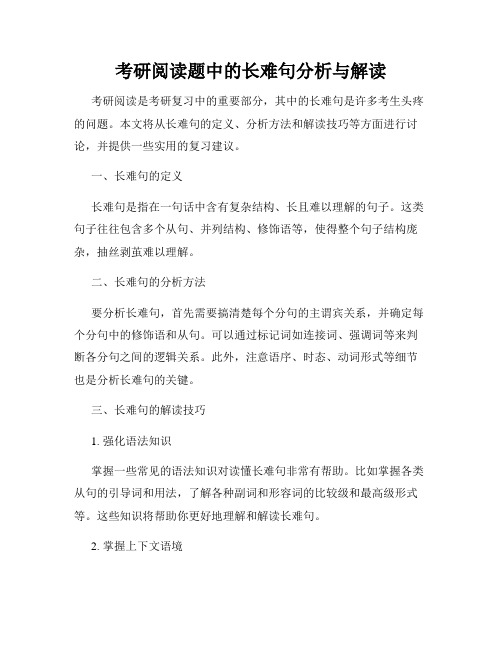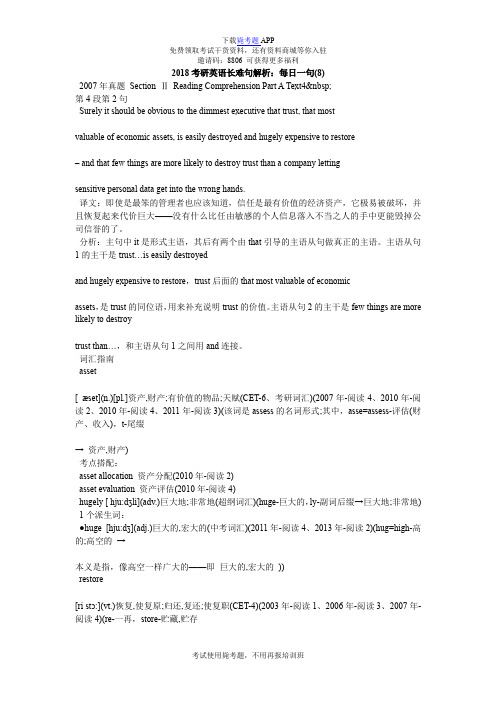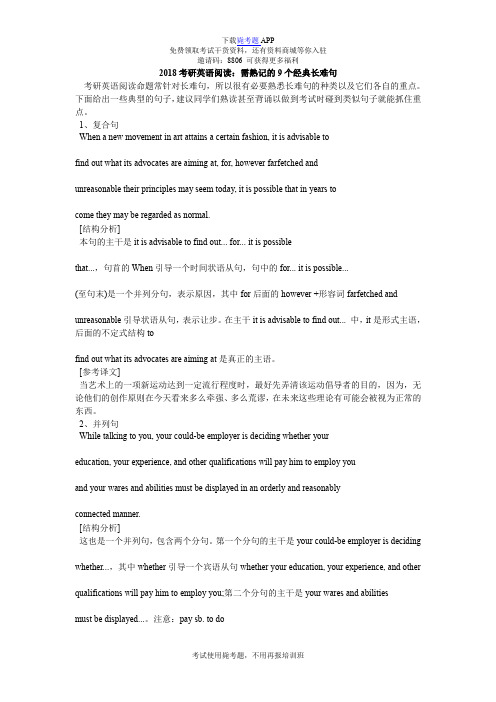考研阅读中那些傻傻分不清楚的句子_毙考题
考研英语阅读材料汇编之科技类(2)-毙考题

考研英语阅读材料汇编之科技类(2)阅读是考研英语的重要题型之一,也是保障英语成绩的关键题目。
因此,考研学子们要充分重视英语阅读,除了平时多多阅读英语杂志、报纸外,还需要针对阅读进行专项训练。
小编整理了关于考研英语阅读题源的系列文章考研英语阅读材料汇编之科技类(2),请参考!Who s the Smart Sibling?Ten weeks ago, Bo Cleveland and his wife embarked on a highly unscientific experiment-they gave birth to their first child. For now, Cleveland is too exhausted to even consider having another baby, but eventually, he will. In fact, hes already planned an egalitarian strategy for raising the rest of his family. Little Arthur won t get any extra attention just because he s the firstborn, and, says his father, he probably won t be much smarter than his future .siblings; either. It s the sort of thing many parents would say, but it s a bit surprising coming from Cleveland,who studies birth order and IQ at Pennsylvania State University. As he knows too well, a study published recently in the journal Science suggests that firstborns do turn out sharper than their brothers and sisters, no matter how parents try to compensate. Is Cleveland wrong? Is Arthur destined to be the smart sibling just because he had the good luck to be born first?For decades, scientists have been squabbling over birth order like siblings fighting over a toy. Some of them say being a first-, middle- or lastborn has significant effects on intelligence. Others say that s nonsense, The spat goes back at least as far as Alfred Adler, a Freud-era psychologist who argued that firstborns had an edge. Other psychologists found his theory easy to believemiddle and youngest kids already had a bad rap, thanks to everything from primogeniture laws to the Prodigal Son. When they set out to confirm the birth-order effects Adler had predicted, they found some evidence. Dozens of studies over the next several decades showed small differences in IQ; scholastic-aptitude tests and other measures of achievement So did anecdata suggesting that firstborns were more likely to win Nobel Prizes or become (ahem) prominent psychologists.But even though the scientists were turning up birth-order patterns easily, they couldn tpin down a cause. Perhaps, one theory went, the mother s body was somehow attacking the lateroffspring in uterus. Maternal antibody levels do increase with each successive pregnancy. Butthere s no evidence that this leads to differences in intelligence, and the new study in Silence,based on records from nearly a quarter of a million young Norwegian men, strikes down theantibody hypothesis. It looks at kids who are the eldest by accident-those whose older siblingsdie in infancy--as well as those who are true firstborns. Both groups rack up the same highscores on IQ tests. Whatever is lowering the latterborns scores, it isn t prenatal biology, sincebeing raised as the firstborn, not actually being the firstborn, is what counts.The obvious culprits on the nurture side are parents. But it s hard to think that favoritism toward firstborns exists in modem society. Most of us no longer view secondborn as second best, and few parents will admit to treating their kids differently. In surveys, they generally say they give their children equal attention. Kids concur, reporting that they feel they re treated fairly.Maybe, then, the problem with latterborns isn t nature or nurture-maybe there simply isn t a problem. Not all the research shows a difference in intelligence. A pivotal 2000 study by Joe Rodgers ,now a professor emeritus at the University of Oklahoma, found no link between birth order and smarts. And an earlier study of American families found that the youngest kids, not theoldest, did best in school. From that work, say psychologist Judith Rich Harris, a prominent critic of birth-order patterns, it s clear that the impression that the firstborn is more often the academic achiever is false.Meanwhile, many of the studies showing a birth-order pattern in IQ have a big, fat,methodological flaw. The Norwegian Science study is an example, says Cleveland: It scomparing Bill, the first child in one family; to Bob, the second child in another family. Thatwould be fine if all families were identical, but of course they aren t. The study controls forvariables such as parental education and family size. But Rodgers, the Oklahoma professor,notes that there are hundreds of other factors in play; and because it s so hard to discountall of them, he s not sure whether the patterns in the Science article are real.No one is more sensitive to that criticism than the Norwegian scientists. In fact, theyalready have an answer ready in the form of a second paper. Soon to be published in thejournal Intelligence, it s, similar to the Science study except for one big thing: instead ofcomparing Bill to Bob, it compares Bill to younger brothers Barry and Barney. The samebirth- order pattern shows up: the firstborns, on average, score about two points higher thantheir secondborn brothers, and hapless thirdborns do even worse. The purpose of thetwo papers was exactly the same, says Petter Kristensen of Norway s National Instituteof Occupational Health, who led both new studies. But this second one is much more comprehensive, and in a sense it s better than the Science paper. The data are there--within families, birth order really does seem linked to brain power. Even the critics have to soften their positions a little. The Intelligence study must be taken very seriously says Rodgers.No one, not even Kristensen, thinks the debate is over For one thing, there s still that argument about what s causing birth-order effects. It s possible, says UC Berkeley researcher Frank Sulloway, that trying .to treat kids in an evenhanded way in fact results in inequity. Well-meaning parents may end up shortchanging middleborns because there s one thing they can t equalize: at no point in the middle child s life does he get to be the only kid inthe house. Alternatively, says Sulloway; there s the theory he has his money on, the family- niche hypothesis Older kids, whether out of desire or necessity axe often called on to be assistant parents, he notes. Getting that early- taste of responsibility may prime them for achievement later on. If they think Oh, I m supposed to be more intelligent so I d betterdo my homework, it doesn t matter if they actually are more-intelligent, says Sulloway, Itbecomes a self-fulfilling prophecy. If the firstborns homework involves reading Science and Intelligence, there ll be no stopping them now.词汇注解重点单词embark / im ba:k/【文中释义】v.着手,从事【大纲全义】v. (使)上船(或飞机,汽车等):着手,从事extra / ekstr /【文中释义】adj.额外的【大纲全义】adj额外的,附加的n.附加物,额外的东西adv.特别地compensate / kɔmpənseit/【文中释义】v.补偿,弥补【大纲全义】v.(for)补偿,赔偿,抵消nonsense / nɔnsəns/【文中释义】n.荒谬的言行,胡话【大纲全义】n.胡说,废话;冒失(或轻浮)的行为rap / r p/【文中释义】n.不公正的判决,苛评【大纲全义】n.叩击,轻拍,斤责,急敲(声);不公正的判决,苛评,v. 敲,拍,打,斤责,使着迷predict / pri dikt/【文中释义】v.预言【大纲全义】v.预言,预测,预告prominent / prɔminənt/【文中释义】adj杰出的【大纲全义】adj.突起的,凸出的;突出的,杰出的offspring /ɔfspriŋ; (us) ɔ:f-/【文中释义】n..子孙,后代【大纲全义】n. 子孙,后代,结果,产物;(动物的)崽successive /sək sesiv/【文中释义】adj.连续的【大纲全义】adj.接连的,连续的pregnancy / Pregnənsi/【文中释义】n.怀孕【大纲全义】n.妊振;怀孕(期);(事件等的)酝酿;(内容)充实,富有意义nurture / nə: tʃə/【文中释义】n.养育,教育【大纲全义】n.营养品;养育,培养,滋养v. 给予营养物,养育,培养,滋养超纲单词egalitarian n. 平等主义sibling n. 兄弟妞妹squabble v. 为争吵spat n. 争吵primogeniture n. 长子身份aptitude n. 才能,资质anecdata n. 二逸事证据prenatal adj. 产前的,出生前的重点段落译文两周前,伯克利夫兰和他的妻子进行了一项非常不科学的实验他们生下了他们的第一个孩子。
考研阅读题中的长难句分析与解读

考研阅读题中的长难句分析与解读考研阅读是考研复习中的重要部分,其中的长难句是许多考生头疼的问题。
本文将从长难句的定义、分析方法和解读技巧等方面进行讨论,并提供一些实用的复习建议。
一、长难句的定义长难句是指在一句话中含有复杂结构、长且难以理解的句子。
这类句子往往包含多个从句、并列结构、修饰语等,使得整个句子结构庞杂,抽丝剥茧难以理解。
二、长难句的分析方法要分析长难句,首先需要搞清楚每个分句的主谓宾关系,并确定每个分句中的修饰语和从句。
可以通过标记词如连接词、强调词等来判断各分句之间的逻辑关系。
此外,注意语序、时态、动词形式等细节也是分析长难句的关键。
三、长难句的解读技巧1. 强化语法知识掌握一些常见的语法知识对读懂长难句非常有帮助。
比如掌握各类从句的引导词和用法,了解各种副词和形容词的比较级和最高级形式等。
这些知识将帮助你更好地理解和解读长难句。
2. 掌握上下文语境长难句往往出现在篇章的关键位置,读懂上下文将有助于理解句子的用意。
通过阅读前后文,抓住关键词和核心信息,能够更好地揭示句子的意思。
3. 独立思考与联想尝试用自己的话将长难句简化,将其中抽象的概念转化为具体的例子,或是采取换一种说法的方式来解读长难句。
通过与已有的知识经验进行对照和联想,或许能够更好地领会长难句的含义。
4. 查找具体信息在考研阅读中,长难句往往包含一些具体的数据和事实,这些信息能够帮助我们理解整个句子的含义。
因此,当遇到长难句时,及时查找相关的具体信息是非常重要的。
四、复习建议1. 阅读大量样题通过大量阅读考研真题和模拟题中的阅读理解部分,能够熟悉长难句的出现频率和形式,并逐渐提高对长难句的分析和解读能力。
2. 制定复习计划制定合理的复习计划是高效备考的关键。
在阅读复习中,要将一定的时间分配给长难句的分析和解读练习,通过不断练习提高自己的长难句应对能力。
3. 查漏补缺复习过程中要时刻关注自己的薄弱环节,及时查漏补缺。
对于长难句的分析和解读,如果有不熟悉的知识点或难点,可以找相关的资料进行学习,找到合适的解决方法和技巧。
2018考研英语长难句解析:每日一句(8)_毙考题

2018考研英语长难句解析:每日一句(8)2007年真题Section ⅡReading Comprehension Part A Text4 第4段第2句Surely it should be obvious to the dimmest executive that trust, that mostvaluable of economic assets, is easily destroyed and hugely expensive to restore– and that few things are more likely to destroy trust than a company lettingsensitive personal data get into the wrong hands.译文:即使是最笨的管理者也应该知道,信任是最有价值的经济资产,它极易被破坏,并且恢复起来代价巨大——没有什么比任由敏感的个人信息落入不当之人的手中更能毁掉公司信誉的了。
分析:主句中it是形式主语,其后有两个由that引导的主语从句做真正的主语。
主语从句1的主干是trust…is easily destroyedand hugely expensive to restore,trust后面的that most valuable of economicassets,是trust的同位语,用来补充说明trust的价值。
主语从句2的主干是few things are more likely to destroytrust than…,和主语从句1之间用and连接。
词汇指南asset[ æset](n.)[pl.]资产,财产;有价值的物品;天赋(CET-6、考研词汇)(2007年-阅读4、2010年-阅读2、2010年-阅读4、2011年-阅读3)(该词是assess的名词形式;其中,asse=assess-评估(财产、收入),t-尾缀→ 资产,财产)考点搭配:asset allocation 资产分配(2010年-阅读2)asset evaluation 资产评估(2010年-阅读4)hugely [ hju:dʒli](adv.)巨大地;非常地(超纲词汇)(huge-巨大的,ly-副词后缀→巨大地;非常地) 1个派生词:●huge [hju:dʒ](adj.)巨大的,宏大的(中考词汇)(2011年-阅读4、2013年-阅读2)(hug=high-高的;高空的→本义是指,像高空一样广大的——即巨大的,宏大的))restore[ri stɔ:](vt.)恢复,使复原;归还,复还;使复职(CET-4)(2003年-阅读1、2006年-阅读3、2007年-阅读4)(re-一再,store-贮藏,贮存→ 一再地贮藏能量、养精蓄锐——即恢复,使复原,引申为归还,复还和使复职。
2018考研英语阅读:需熟记的9个经典长难句_毙考题

2018考研英语阅读:需熟记的9个经典长难句考研英语阅读命题常针对长难句,所以很有必要熟悉长难句的种类以及它们各自的重点。
下面给出一些典型的句子,建议同学们熟读甚至背诵以做到考试时碰到类似句子就能抓住重点。
1、复合句When a new movement in art attains a certain fashion, it is advisable tofind out what its advocates are aiming at, for, however farfetched andunreasonable their principles may seem today, it is possible that in years tocome they may be regarded as normal.[结构分析]本句的主干是it is advisable to find out... for... it is possiblethat...,句首的When引导一个时间状语从句,句中的for... it is possible...(至句末)是一个并列分句,表示原因,其中for后面的however +形容词farfetched andunreasonable引导状语从句,表示让步。
在主干it is advisable to find out... 中,it是形式主语,后面的不定式结构tofind out what its advocates are aiming at是真正的主语。
[参考译文]当艺术上的一项新运动达到一定流行程度时,最好先弄清该运动倡导者的目的,因为,无论他们的创作原则在今天看来多么牵强、多么荒谬,在未来这些理论有可能会被视为正常的东西。
2、并列句While talking to you, your could-be employer is deciding whether youreducation, your experience, and other qualifications will pay him to employ youand your wares and abilities must be displayed in an orderly and reasonablyconnected manner.[结构分析]这也是一个并列句,包含两个分句。
2019考研英语翻译丢分点解析:词汇匮乏_毙考题

下载毙考题APP免费领取考试干货资料,还有资料商城等你入驻邀请码:8806 可获得更多福利2019考研英语翻译丢分点解析:词汇匮乏翻译题型在历年考试中得分率相对较低,难度大。
如何提升这部分的得分呢?小编希望考生打好基础,把一些丢分的点给避过去。
小编总结了一些丢分点,为大家解析,希望考生认真学习克服:2019考研英语翻译丢分点解析:词汇匮乏做好翻译题目的第一步就是要对英语综合知识有一个整体且具体的掌握,有其对句子结构及句子成分的分析及在进行翻译处理时采取的必要步骤。
举个例子:Now some merchants have been exposed to the charge that they reserve their soya bean with ulterior motives。
仔细分析整个句子,我们不难发现:该句中的that从句不是charge的定语从句,而是它的同位语从句,因为that在从句中不做任何成分,不符合定语从句的用法,所以that不是关系代词,只能作为连词来引导charge的同位语从句,来进一步解释charge的内容。
因此,应该翻译为...被指责,说... ,这样这个句子就可以译为:(1) 现在有些商人已经收到了这样的谴指责,即他们储存大豆有其不可告人的目的;或者(2)现在有些商人已经被指责,说他们储存大豆有其不可告人的目的。
若是在进行翻译处理的时候,考生将that译为charge的定语从句,就会使这个句子被误译为:现在有些商人已经收到他们储存大豆有其不可告人目的的指责。
只要将这个句子翻译为charge的同位语从句,就可以理顺原文的逻辑关系,从而使译文更加忠实通顺。
在考研英语翻译中除了要解决必要的词汇问题,即在考场上不能见到一个句子,10个单词7个不认识,这样的情况下基本下考研就可以开始着手准备明年的考试了;第二个在准备翻译模块时应该注意的就是对英语基础语法知识的梳理。
其中最基本的就是五大基本句型及各种句子成分及其在句中的呈现形式;若是在翻译上,考生对词汇及语法没有什么大的问题后,接下来要处理的就是之前和大家讲过的这些翻译技巧以及英汉语言之间的区别。
考研英语长难句解析:每日一句(70)_毙考题

2018考研英语长难句解析:每日一句(70)2010年真题Section ⅡReading Comprehension Part A Text 1 第3段第5句So few authors have brains enough or literary gift enough to keep theirown end up in journalism, Newman wrote, that I am tempted to definejournalism as a term of contempt applied by writers who are not read towriters who are .译文:拥有足够的才智或文学天赋来坚持新闻写作的作家是如此之少,纽曼写道:以致我禁不住把‘新闻业’定义为‘作品没有人看的作家对那些作品广受欢迎的作家的轻蔑之辞’。
分析:该句的主干是Newmanwrote…,前后的双引号之内都是直接引语。
这个直接引语是so…that…结构,that引导的是结果状语从句。
直接引语里的主语是So fewauthors,brains和literary gift并列做谓语have的宾语,两个enough都是定语,分别修饰两个宾语,不定式to keep theirown end up in journalism是结果状语。
在that引导的结果状语从句中,to define…是主语的补足语,journalism 是define的逻辑宾语,as引导的部分是该宾语的补足语。
过去分词短语applied by writerswho are not read to writers whoare是contempt的后置定语,其中有两个由who引导的定语从句修饰两类不同的writers。
词汇指南author[ ɔ:θə](n.)作者;创始人(高考词汇)(2008年-阅读2、2010年-阅读1)(au=auɡ-词根,大,th=thinkinɡ-思想,or-表人→大思想家、著作家——即作者,引申为某一学科、机构等的创始人。
2018考研英语阅读:错误选项常具备的17个特点_毙考题

毙考题APP
2018考研英语阅读:错误选项常具备的17个特点
考场的时间限制和考研英语的题量,都要求各位考研er在考场上的答题速度必须要快,阅读作为英语中占分比重最大的一项,如何快速锁定正确答案,我们一起来看看错误选项具备哪些特征?
一、错误选项的十大基本特征
1.无中生有(出现原文中未提及的概念)
2.正反混淆(选项的意思跟原文的意思相反)
3.答非所问(选项符合原文,但是不符合题干)
4.扩大范围(注意隐蔽型的扩大范围mostly/mainly/generally)
5.因果倒置
6.常识判断(符合常识的不一定是正确答案,但是不符合常识的一定不是正确答案)
7.过分绝对。
(never/must/no等+名词,若有缓和就不是错误的)
8.推理过远
9.变换词性
10.偷换概念
提醒:前六种相对容易判断,后四种要利用文章的逻辑关系才可判断出来。
二、错误选项的内容来源
1.文中不同内容的嫁接
2.文中内容的篡改
3.文中相关内容的杜撰
4.对文中提到的内容范围进行放大或缩小处理
5.断章取义
6.因果关系倒置
7.相似但不同性质词语的替换(最具迷惑性,如把in sympathy with赞同替换成了show sympathy for同情把live with忍受替换成了enjoy享受)
提醒:照抄原文不一定是答案,近义词替换才是。
考试使用毙考题,不用再报培训班
邀请码:8806。
双胞胎傻傻分不清句子

双胞胎傻傻分不清句子双胞胎傻傻分不清,是指两个长得非常相像的双胞胎,让人很难分辨出谁是谁。
这种情况在真实生活中常常发生,也给人们带来了一些有趣的故事。
下面列举了一些有关双胞胎傻傻分不清的句子:1. 在我学校里有一对双胞胎,他们的长相和身材都如出一辙,每次看到他们我都分不清谁是谁。
2. 我的朋友有一对双胞胎姐妹,她们的声音和说话的方式都一模一样,经常让人分不清到底是哪一个在说话。
3. 有一次我在商场遇到了一对双胞胎,他们穿着完全一样的衣服,连发型和配饰都一样,简直就是一个模子刻出来的,让人分不清楚谁是谁。
4. 我的邻居是一对双胞胎兄弟,他们不仅长相相似,连兴趣爱好和性格都非常相近,经常让人分不清谁是谁。
5. 我曾经在电视上看到一对双胞胎参加选秀节目,他们的声音和舞台表现完全一致,连评委都分不清谁是谁。
6. 我的同学是一对双胞胎姐妹,她们的穿着风格和化妆技巧都一样,经常让人分不清到底是哪一个在面前。
7. 我的姐姐和她的好朋友是一对双胞胎,她们不仅长相相似,连衣服和饰品都喜欢穿一样的,让人分不清谁是谁。
8. 我的表姐和她的男朋友是一对双胞胎,他们的穿着和发型都一模一样,经常让人分不清谁是谁。
9. 我曾经在街上遇到一对双胞胎儿童,他们不仅长得一模一样,连穿着和表情都一样,让人分不清到底是哪一个。
10. 我的同事是一对双胞胎兄弟,他们的声音和说话的方式都一样,经常让人分不清到底是哪一个在讲话。
通过以上句子的描述,我们可以看出双胞胎傻傻分不清的情况在生活中并不少见。
这种现象不仅让人觉得有趣,也给人们带来了一些困扰,特别是在与双胞胎打交道时,很容易把他们搞混。
但是,双胞胎也是一种独特的存在,他们之间的相似之处也让人们感受到了亲密和温暖。
- 1、下载文档前请自行甄别文档内容的完整性,平台不提供额外的编辑、内容补充、找答案等附加服务。
- 2、"仅部分预览"的文档,不可在线预览部分如存在完整性等问题,可反馈申请退款(可完整预览的文档不适用该条件!)。
- 3、如文档侵犯您的权益,请联系客服反馈,我们会尽快为您处理(人工客服工作时间:9:00-18:30)。
考研阅读中那些傻傻分不清楚的句子
在做考研英语阅读的时候,总是能够遇到那些分不清楚的句子,这些句子看似简单,但却总能在关键时刻成为做题的拦路虎。
看看下面的这些句子是不是也难道你了呢?
句1:I have discovered, as perhaps Kelsey will after her much-publicized resignation from the editorship of She after a build-up of stress, that abandoning the doctrine of juggling your life, and making the alternative move into downshifting brings with it far greater rewards than financial success and social status. (2001Text5)
如此庞然大物的一句话,其实是用来吓唬你们的,它只是一层纸老虎而已。
主干部分:句子主语I,谓语have discovered,从as到stress两个逗号间为插入语;宾语是that。
简化后为:I have discovered, , that .
两个逗号之间:这个一个插入语(但不是所有的逗号都是插入语哦!),是由as引导的一个从句充当插入语。
as从句中主语Kelsey谓语是will(后面省略了discover,英语是有多懒,能省就省!);接下来after 是介词短语,后面又出现一个after介词短语。
as后面的意思就是:也许正如Kelsey一样,在经历巨大压力后,她公开宣布辞去She杂志编辑的职位,在这以后,她也许也会有同样发现。
(两个after记得倒着翻译哦,after太多,主干可以最后翻。
)
从句部分:再看that从句,首先这是个宾语从句(一定要分清楚是什么从句哦!)。
that宾语从句中,主语是abandoning sth and making sth.,谓语是brings,宾语是rewards。
整句简化后:I have discovered, , that abandoning sth and making sth brings rewards. (我发现放弃和做..带来了回报。
)
整句译文:
我已经发现,也许正如Kelsey一样,在经历巨大压力后,她公开宣布辞去She杂志编辑的职位,在这以后,她也许也会有同样发现,放弃忙忙碌碌的生活哲学,转而过一种放慢生活节奏的生活所带来的回报,比经济成功和社会地位更有价值。
句2:Although it ruled that there is no constitutional right to physician-assisted suicide, the Court in effect supported the medical principle of double effect , a centuries-old moral principle holding that an action having two effects a good one that is intended and a harmful one that is foreseen is permissible if the actor intends only the good effect. (2002Text4)
再看到这样一个长句子,不足为奇了吧,已经太常见了,几乎篇篇都有,因此大家得养成见怪不怪的好习惯,沉着冷静才是对策。
主干部分:主语the Court,谓语supported,宾语the medical principle。
(法庭支持医学原则)
从句部分:开头Although引导了让步状语从句,主语是it,谓语是ruled,宾语是由that 引导的宾语从句,意思是:虽然它(即主句主语the Court法院)裁决到医助自杀没有宪法权利。
同位语部分:a centuries-old到句子结束是double effect这个principle的同位语,意思是:一个好几个世纪的道德原则。
holding that是现在分词做后置定语修饰前面的principle,所以是:此原则认为一个行为具有双重效果希望大道的好效果和可以预见到的坏效果如果行为者只想要好的效果,这个行为是可以允许的。
整句译文:
虽然法院裁决到医助自杀没有宪法权利,但最高法院实际上却支持了医疗界的双效原则,这是一个好几个世纪的道德原则,此原则认为一个行为具有双重效果希望大道的好效果和可以预见到的坏效果如果行为者只想要好的效果,这个行为是可以允许的。
现在,你能分清楚了么?。
